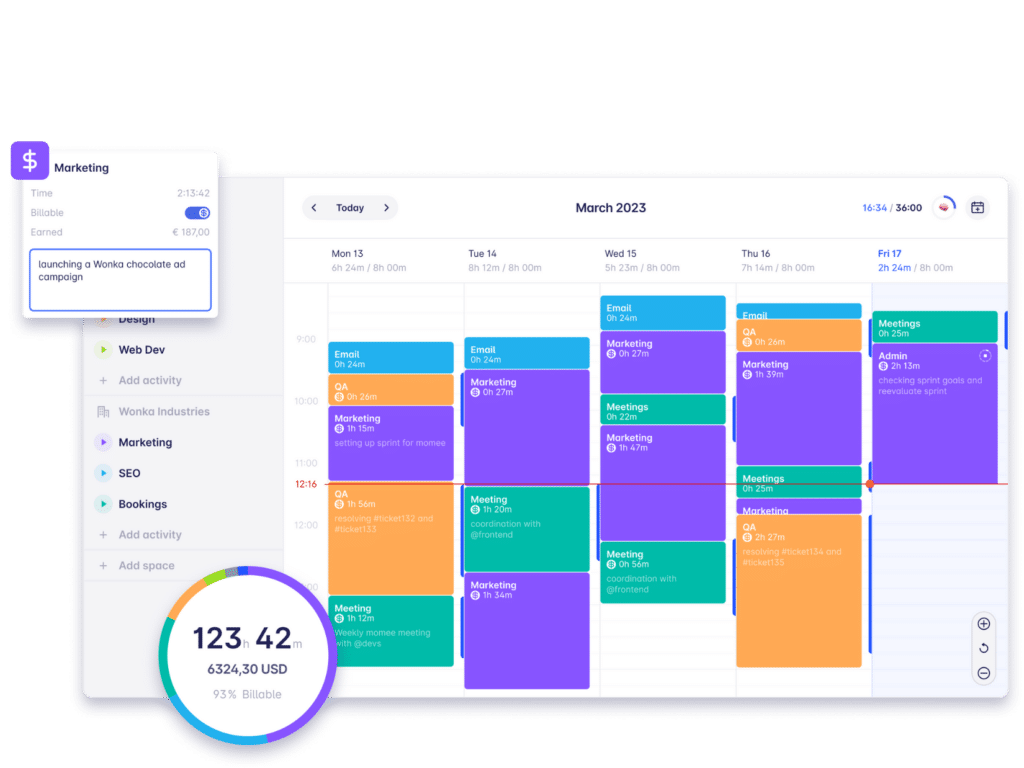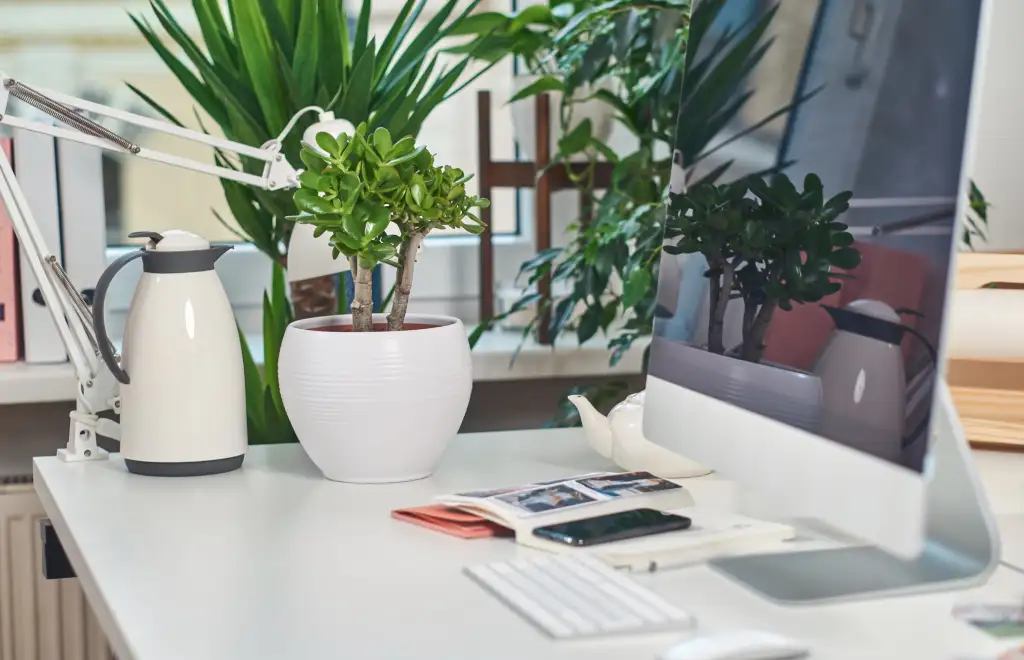How to Improve Focus and Concentration: The Ultimate Guide
We live in a highly fast-paced world full of distractions everywhere. It’s becoming more and more challenging to maintain focus and concentration on things that matter. With the constant bombardment of notifications, emails, and social media updates, it’s no wonder that many people struggle to stay on track.

However, the ability to focus on a specific task until it’s fully complete is one of the most significant indicators of future success, both personally and professionally.
This article will explore tips and ways to improve your focus and concentration. After that, we’ll briefly explain the main benefits of improving it.
How to improve focus and concentration: 15 effective ways
1. Set goals and prioritize tasks
Setting goals and prioritizing is one of the best ways to improve focus. This skill can significantly impact your life in a highly positive way.
By setting goals, you’re giving your actions a clear direction and purpose and allowing yourself to stay motivated and focused on what is most important.
On the other hand, when you prioritize your tasks of the day and activities, you ensure that you’re allocating time and energy to the most important items on your to-do list.
It will help you feel less overwhelmed and stressed and reduce the risk of procrastination.
So, set specific and measurable goals for each day, week, and month. Break them into smaller, manageable tasks, and prioritize them based on their importance and urgency.
This way, you’ll have a clearer vision of what needs to be done and avoid procrastination.

2. Track time
Time tracking is one of the most potent and effective ways to improve focus and productivity.
Let’s see how time tracking increases focus and concentration:
- Increased awareness: When you track your time, you become more aware of how you’re spending it. This awareness can help you identify distractions and time-wasting activities and allow you to make adjustments to better focus your time and attention on your priorities.
- Accountability: Time tracking can help create a sense of responsibility, motivating you to stay on task and avoid distractions. Knowing you’re being monitored may make you less likely to engage in activities unrelated to your goals.
- Goal setting: Time tracking can help you set and achieve specific goals. You can track your progress and measure your success over time by breaking down your work into smaller, manageable tasks. This can help you stay focused on your work goals and make progress toward them.
- Time awareness: Time tracking can help you better understand how long tasks take and how much time you have available to complete them. This can help you prioritize your work and use your time better.
Tracking your time can increase focus and concentration by raising awareness, creating accountability, facilitating goal setting, and improving time management skills.
We highly suggest you use time tracking software with the right features for your daily routine to start tracking your time.

3. Use time management techniques
Time management methods can help you boost and keep your focus to the max because they help you with the following:
- Prioritization: Time management techniques can help you prioritize your tasks and activities. Focusing on the most critical and urgent tasks can reduce distractions and ensure you use your time effectively.
- Elimination of time wasters: Time management methods help you eliminate time-wasting activities and distractions. You can improve your concentration and productivity by minimizing interruptions, such as checking social media or email.
- Reduced stress: Effective time management can reduce stress and time anxiety, which can help you stay focused and concentrated. Having a clear plan for your day can reduce the sense of overwhelm and increase your ability to focus on the task at hand.
These are the main benefits of time management on your concentration and focus. We suggest you try the following time management methods for optimal results: the Pomodoro technique, time blocking, time mapping, and Eat the frog.
Something extra for you:
4. Don’t multitask
Avoid multitasking and context-switching as much as possible. Multitasking is one of the biggest enemies of productivity, effective time management, and a main cause of work overload.
Today, most of us unconsciously multitask while using our smartphones. We play games, check our email, go through social media, text, and use many apps while watching television, eating, doing work, or even talking to someone.
Multitasking has become a regular part of our lives; most do it without noticing. By multitasking, you’re diluting your focus and attention, so even if you’re working on something relatively simple, it’ll take much longer to get done.
It’s a massive misconception that doing multiple things simultaneously will allow you to do more in less time, and that’s the opposite. Constant multitasking can lead to memory problems as well as increased distractibility.
5. Turn off notifications
A classic way to improve focus and concentration: turning off notifications.
Yes, it includes both personal and professional notifications: slack, email, Microsoft Teams, and other apps that can disturb you.
We’re constantly bombarded with endless notifications on our phones, emails, social media, etc., and it takes a significant toll on our overall attention.
These kinds of distractions reduce our productivity and efficiency and can lead to unnecessary errors and mistakes, impacting the quality of our work.
Set your phone to “Do Not Disturb” mode, and you’ll see how your phone stops buzzing immediately. If, for some reason, you’re concerned about emergencies, you can program your phone to let essential phone calls and text messages from specific contacts through.
You can also hide your favorite apps from your phone’s home screen. You’ll be less tempted to use them if you can’t see them.
Additionally, try changing your screen to grayscale. Colorful notifications and bright icons will always get your attention more easily. A black-and-white screen softens their appeal.
And finally, use technology to help you and not the opposite. For example, adopting software to boost focus and concentration is one of the best tips to help you on this mission.

6. Listen to relaxing music
Something that also works for some people is listening to music. According to a study by the Florida National University,
“Music is an effective stress reducer in healthy individuals and people with health problems. Research finds that listening to soothing music can decrease blood pressure, heart rate, and anxiety levels in heart patients”.
Another article in The Guardian says that music.
“provides non-invasive noise and pleasurable feelings to effectively neutralize the unconscious attention system’s ability to distract us.”
So, music helps improve your brain’s focus. But be careful! Not all kind of music increases productivity. Read our article if you want to know the types of music that increase your productivity.
7. Cognitive training
Just like physical Training, Cognitive Training is intended to develop greater strength, stamina, coordination, and flexibility, except for your brain.
Cognitive Training is the mental processes our brains use to take in, store, retrieve, organize, apply, and reason with information. It helps to strengthen the neural connections in the brain responsible for these cognitive functions.
If you train regularly, you can improve your ability to pay attention, sustain your focus for extended periods, and avoid distractions that may interfere with concentration.
Additionally, cognitive Training can help to improve working memory, which can be particularly helpful for tasks that require sustained concentration, as it enables you to keep track of information and stay focused on the task at hand.
Also, cognitive Training can improve overall cognitive function, such as decision-making and problem-solving abilities.
This can help you better manage your workload, make more effective decisions, and stay focused on your work for extended periods.

8. Take breaks
Taking breaks is a vital aspect of maintaining a healthy body and mind.
Our brains and bodies are not designed to operate at total capacity for long periods without rest.
Taking regular breaks helps you to deal with stress at work, prevent burnout, and improve overall happiness.
There are many types of breaks you can take during work time. You can prefer to take a short break, a more physically active break, or take a more extended break.
The first one, the short break, involves taking brief pauses during work to refocus and recharge.
The second one, the physical break, can involve stretching, taking a short walk, or even doing some yoga.
And finally, the extended break includes going on a vacation or doing a hobby.
Either way, the main point of taking breaks is they allow you to disconnect from work and recharge mentally and physically.
But taking breaks is more than just boosting productivity: it can also help to inspire creativity.
Ultimately, by taking breaks, you’re one step closer to achieving a healthy work-life balance, enhancing productivity and creativity, and maintaining optimal physical and mental health.
9. Exercise
According to the Australian Government Department of Health,
“Exercise releases chemicals like endorphins and serotonin that improve your mood. It can also get you out in the world, help reduce loneliness and isolation, and put you in touch with other people.”
This means that engaging in physical activity helps to improve general physical health but also has a positive impact on mental health.
By exercising regularly, you will have reduced stress and anxiety levels, as well as depression.
Regular exercise can also improve cognitive function, including memory and concentration. Additionally, exercise can help you manage your weight, reduce the risk of chronic diseases, and promote longevity.
Remember that exercise can take various forms, and not only going to the gym if that’s something you’re not into. Walking, running, cycling, or swimming are great examples of exercise you can do outdoors.

10. Practice mindfulness
If you wish to cultivate a greater sense of awareness, practicing mindfulness is a great way to do it. By definition, mindfulness is
” the practice of being aware of your body, mind, and feelings in the present moment, thought to create a sense of calm.”
By practicing mindfulness, we can be more connected to our thoughts, feelings, and physical sensations, which can help us to manage stress, anxiety, and other negative emotions.
Additionally, mindfulness can enhance our cognitive abilities, including memory, attention, and decision-making.
You can practice mindfulness in many ways, such as meditation, breathing exercises, and body scans.
By practicing mindfulness regularly, you can develop a greater sense of calmness, clarity, and emotional balance, positively impacting all aspects of life, including relationships, work, and overall well-being.
11. Get enough sleep
This is one of the best ways to improve focus and concentration. Getting enough sleep is critical for maintaining both optimal physical and mental health.
Sleep is vital to our physical health and helps us with memory consolidation, learning, and decision-making.
Lack of sleep can have terrible consequences in cognitive and emotional effects, such as irritability, poor judgment, and mood swings.
Many studies reveal that the recommended time an adult should sleep is at least 7 to 9 hours per night, depending on personal needs.
Establishing a regular sleep routine, avoiding stimulants such as caffeine before bedtime, and creating a comfortable sleep environment can help you promote healthy sleep habits.
12. Eat a healthy diet
A balanced diet includes a variety of nutrient-dense foods, such as fruits, vegetables, whole grains, lean proteins, and healthy fats.
This diet can provide the necessary vitamins, minerals, and nutrients our bodies need for excellent cognitive and physical health.
Besides the obvious health benefits of eating a healthy diet, you can also improve cognitive function, including memory and concentration. You can positively impact mood and overall mental health

13. Keep a clean and organized workspace
Usually, this is an underrated tip by those who want to know how to improve focus and concentration. Trust us; this might be a game-changer!
A cluttered workspace can create a chaotic and distracting environment that can negatively impact your work and productivity.
Keeping your workspace clean and organized can reduce stress and promote a sense of calmness, making it easier to stay focused on tasks longer.
Find out what are the signs of stress at work.
A clean workspace promotes a sense of professionalism and attention to detail, which can positively impact your work and results.
If you need help, implement organizational systems like file folders, storage bins, and desk organizers. It will reduce clutter and make finding important documents and items more accessible.
Remember, your work environment should be welcoming and comfortable for you. Create a space that will inspire you to get to work and make doing so easy!
14. Create a routine that works
Creating a routine can be challenging, especially one that works for you. However, if you manage to do it properly, you’re promoting productivity and reducing unnecessary stress.
An established routine can help create structure and consistency in your daily life, promoting a sense of control and stability.
You can maximize your productivity and efficiency by creating a routine that aligns with your personal needs, work schedule, and lifestyle.
Find the differences between productivity and efficiency.
Try to create the most complete routine possible, with time for self-care activities, such as
- exercise
- meditation
- hobbies
These activities and hobbies help to reduce stress and promote overall mental and physical well-being.
However, don’t be super strict, as it is essential to be flexible and adjust your routine as needed: unexpected events and changes can occur, so don’t be too hard on yourself.
Finding a routine that works for you may take time and experimentation, but the benefits of establishing a consistent daily routine can be significant in the long run.
15. Indulge in small personal rewards
A little incentive can make even the most boring of tasks worthwhile.
Indulging in small personal rewards is critical for promoting motivation, enhancing self-esteem, and maintaining a positive vibe in life.
When you achieve a goal or complete a task successfully, reward yourself with something small, such as:
- your favorite snack
- a movie
- a relaxing bath
- a break
- ecc.
This is a great way to promote continued progress.
However, don’t get too excited. It’s essential to indulge in rewards in moderation, as overindulging can lead to negative consequences, such as unhealthy habits or excessive spending.
Finding a balance between indulging in small rewards and maintaining healthy habits is critical.
Benefits of improving your focus
Now that you have learned how to improve your focus with our practical tips, let’s find out why it’s essential.
By definition, focus means the “careful attention that is given to something such as a task, or the ability to give your full attention to something:.
Focus refers to someone’s ability to concentrate on a specific task or subject and maintain attention until it’s fully complete.
At work, the ability to focus for extended periods allows you to complete your job efficiently and accurately.
Improving your focus helps you become more productive in the workplace and accomplish more tasks, leading to career progress. Here are a few essential benefits of improving your focus:
- Reduces your overall stress: by trying to improve your concentration, you can entirely focus on what’s most important at work. When you’re focused, you can complete more tasks in a shorter time and be more productive.
- Helps you prevent errors: improving your focus can help you avoid making “stupid” mistakes, allowing you to improve the overall quality of your work. When you’re more focused and dedicated, you can complete your tasks with fewer mistakes and have extra time to review them.
- Allows you to enhance your cognitive abilities: trying multiple tasks can make it more challenging to complete the job with quality and the right amount of creativity. Focusing on a single study at a time can help you think about every step of the way and create more effective solutions.
FAQS
Can focus be improved?
Of course! As we mentioned in this article, if you follow most of the tips we just shared, you will see a significant change in your focus and concentration levels.
How to improve concentration and focus while working?
There are many changes you can make to help you boost your concentration and focus, such as turning off notifications, creating a routine, having a clean workspace, setting goals, prioritizing tasks, and taking breaks.
How to improve concentration and focus while studying?
Just make sure you’re studying in a relaxed environment with no distractions, create a to-do list, and take a few breaks to boost productivity.
Conclusione
Now, you know how to improve your focus and concentration. You also understand that it requires effort and consistency, but it’s worth it.
So, be patient: improving your focus and concentration does not happen overnight; it takes a lot of work. It requires consistent effort and practice.
So don’t be too hard on yourself; allow yourself to make mistakes when necessary. Every moment will serve as a lesson for future situations.
Just follow the different ways to improve your focus and concentration we mentioned previously. You will notice a massive difference in your daily performance and productivity.
Just like the famous quote by Denis Waitley, “Don’t dwell on what went wrong. Instead, focus on what to do next. Spend your energies on moving forward toward finding the answer.”
Potreste essere interessati a quanto segue: